|
In the
early
1970’s, I picked up a book that when I read the opening line
it resonated inside
my head like the peel of a church bell making me sit up to attention:
"His
name was Rambo, and he was
just some nothing kid for all anybody knew, standing by the pump of a
gas
station."
I was
not the
only one, because it had the same effect on my friend and Shots Editor
Mike
Stotter. It was of course the opening line of a debut novel entitled First
Blood
by a writer called David Morrell; and soon the world would know about
his
creation, the iconic anti-hero John Rambo.
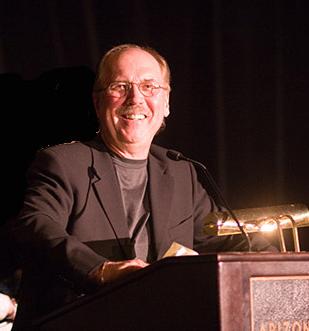
Morrell
became
one of our all time favourite writers and I fulfilled a dream in 2003
by
actually meeting and interviewing him, whilst Mike met David for the
first time
at Left Coast Crime 2006 but let’s not get ahead of ourselves
here.
So who is John Rambo?
Google
reveals
more than 18,000,000 hits for him.
The
Oxford English Dictionary cites his name.
Scores of scholarly articles have been written about him. President Reagan
frequently referred to him
in speeches. He is
one of the most
iconic and popular film characters of all time, but if you know him
only from
the movies, you’re in for a surprise.
Rambo
is the
brainchild of international bestselling author David Morrell, who first
penned
the character in his award-winning 1972 novel, First Blood,
published
when Morrell was a young professor in the English department at the University of Iowa.
Until First Blood’s
publication, there had never been an action
book of its kind. Morrell’s
revolutionary novel paved the way for an entirely new action-fiction
style of
writing, and the Rambo character went on to become one of the most
famous literary
characters created in the 20th Century, ranking with Sherlock Holmes,
Tarzan,
and James Bond.
The
Canadian-born Morrell wrote First Blood at the
height of the Vietnam War
in the late 1960s and early 1970s, while studying for his PhD at Pennsylvania State University.
He loosely based the character John Rambo on Audie Murphy,
the most
decorated American soldier from World War Two, who had extreme
difficulties
adjusting to peace time. The
name
alludes to the Season in Hell verse of the French poet, Rimbaud,
(sometimes
pronounced “Rambo”) but is also oddly indebted to
the name of a Pennsylvania apple
that Morrell’s wife drew his
attention to while shopping at a road-side stand.
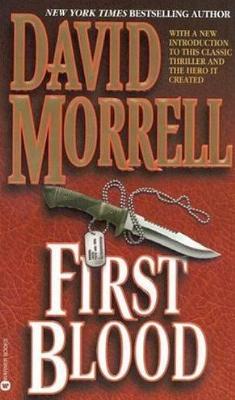
First Blood
was one of the first novels
to depict the effects of post-traumatic stress disorder, which did not
have a
name in 1972, and remains a timely book because of this theme. Taught in high schools and
colleges (Stephen
King used it as a text when he was a writing instructor at the
University of
Maine), the book has been translated into more than 20 languages and
has never
been out of print – a rarity for a book which debuted 36
years ago. Signed
first editions are avidly sought by
book collectors.
If you
think
the Rambo movies are violent, you may be surprised by the novel. While First Blood
was thematically
groundbreaking, stylistically Morrell’s novel is punctuated
by a level of
intensity, action, and characterization that goes far beyond what is
seen in
the book’s movie translation, and is considered fast-paced
and powerful even by
today’s standards of fiction writing.
The novel depicts the character in a more complicated way,
to the point
that (warning – major plot spoiler), Rambo dies in his
original incarnation,
killed by Colonel Trautman, the man who trained him.
Decades
after
Morrell created the character, the global impact of Rambo continues to
grow. Several years
ago, when Morrell
was on book tour in Poland, a journalist pointedly told him that during
the
Solidarity demonstrations that led to the weakening of the Eastern
Bloc,
protestors would watch illegal tapes of Rambo movies, dress up as the
character, and go out to demonstrate.
In
an indirect way, he said, Rambo helped bring about the fall of the
Soviet
Empire. Similarly,
when the Berlin Wall
fell, demonstrators were filmed painting Rambo on the wall before they
tore it
down.
Thirty-six
years after “…some
nothing kid for all
anybody knew, standing by the pump of a gas station …"
first appeared,
Morrell’s Rambo has become so much more than he ever imagined
- a lasting
cultural symbol. Meanwhile,
the author
has pursued an extensive and successful career with numerous highly
regarded
bestselling novels, including Brotherhood of the Rose, which became an
NBC
miniseries broadcast after the Super Bowl in 1989.
He is a three-time recipient of the
distinguished Bram Stoker Award, the latest for his novel Creepers. Prior to the publication
of his graphic novel
about another icon, Captain America: The
Chosen, Comic-Con International
gave him its prestigious Inkpot Award for his outstanding contributions
to
popular culture.
So what
does
Rambo’s creator David Morrell think of the newly released
installment in the
film series?
“I
was blown away,” he
says. “This
is the first time that the tone of my novel has been used in any of the
movies. The
action is deglamorized and
shows the dismaying effect that combat can have on a person. Only in this latest film
does Sylvester
Stallone’s portrayal of the character come eerily close to
the despair of the
character as I imagined him. Rambo
can’t
adjust to what he’s been through and to the destruction
he’s capable of
inflicting. It’s
an exciting action
movie, but it’s also about something.”
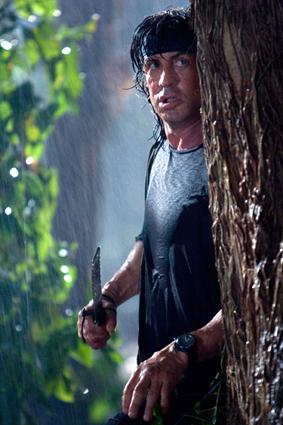
Check out the film trailer
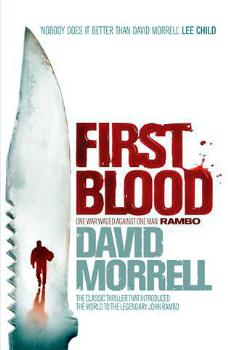
To
celebrate
the return of Rambo to the big screen, you really need to go to the
source
material. Those excellent people at Headline Publishing have just
re-released First
Blood in a stunning special edition. I just read it and it is
as fresh as
brutal knife wound.
To
learn more
about why Shots Ezine considers David Morrell’s work to be
right at the top of
the International Thriller Genre, read the 2003 Shots two part
interview here
:-
Part One
http://archive.shotsmag.co.uk/shots21/intvus_21/dmorrell1.html
Part Two
http://archive.shotsmag.co.uk/shots21/intvus_21/dmorrell2.html
To read
about
David Morrell’s last trip to the UK where
the Shots Editors spent and
evening talking thrillers in 2006 at Left Coast Crime -
http://archive.shotsmag.co.uk/photoshoots_2006/lcc_06/lcc_06.html
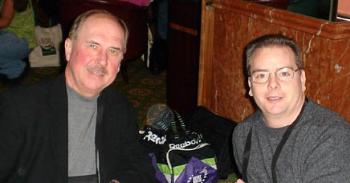
While
The Rap
Sheet featured a retrospective on David Morrell’s work
–
http://therapsheet.blogspot.com/2006/11/morrells-mushrooming-fame.html
And if
you’ve
never read Morrell, you have some real treats ahead of you –
David Morrell’s
Bibliography
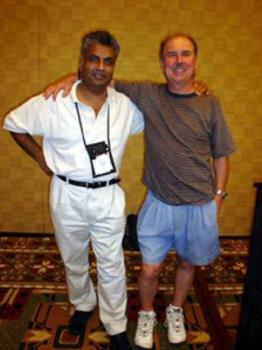
FICTION
First Blood (1972)
Testament
(1975)
Last
Reveille
(1977)
The
Totem
(1979)
Blood
Oath
(1982)
The
Hundred-Year Christmas (1983)
The
Brotherhood of the Rose (1984)
The
Fraternity
of the Stone (1985)
Rambo
(First
Blood Part II) (1985)
The
League of
Night and Fog (1987)
Rambo
III
(1988)
The
Fifth
Profession (1990)
The
Covenant
of the Flame (1991)
Assumed
Identity (1993)
Desperate
Measures (1994)
The
Totem
(Complete and Unaltered) (1994)
Extreme
Denial
(1996)
Double
Image (1998)
Black
Evening
(1999)
Burnt
Sienna
(2000)
Long
Lost
(2002)
The
Protector
(2003)
Nightscape
(2004)
Creepers
(2005)
Scavenger
(2007)
NON-FICTION
John
Barth: an
Introduction (1976)
Fireflies:
A
Father’s Tale of Love and Loss (1988)
American
Fiction, American Myth: Essays by Philip Young (2000)
Lessons
from a
Lifetime of Writing: A Novelist Looks at His Craft (2002)
More
Information available from www.davidmorrell.net
|


